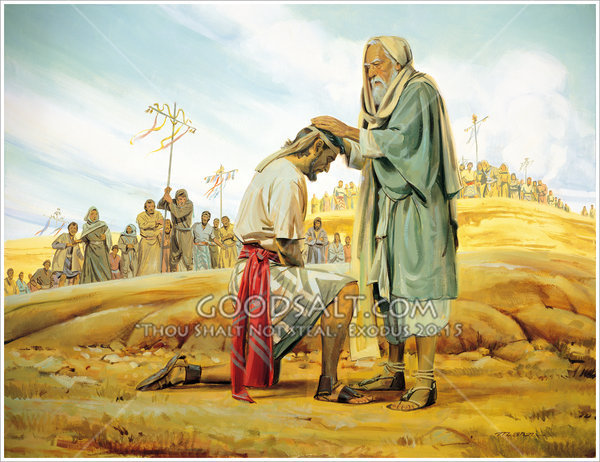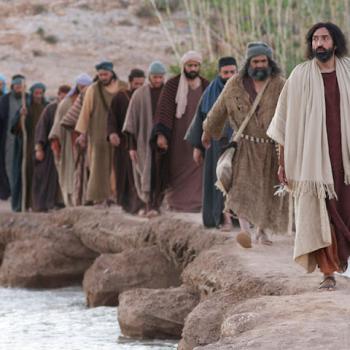Success and Successor

My father always used to say that success needs successors for it to be perpetuated or solidified. According to Peter Drucker, the final test of greatness in a CEO is how well he chooses a successor and whether he can step aside and let the successor run the company. Bishop T. D. Jakes urges that achievement of any level of success requires that we pour it into someone else. Thomas Jefferson declares “Nothing is more incumbent on the old than to know when they should get out of the way and relinquish to younger successors the honors they can no longer earn, and the duties they can no longer perform.”
Therefore, it is important for any venture, organization or enterprise to identify early the one who is to be second in charge and the one who is second-in-line to inherit the leadership. Often both may be one person, but sometimes these are two different people and positions.
However, how does one identify such a true successor? What are the parameters that should form the core of the selection process? What are the qualities that should characterize the one whom we would entrust our role?
To find an answer to such pertinent queries and questions, I turned to the Word of God.
Biblical Search
My investigatiin led me to the book of Exodus, particularly to assimilate the different events that happened after Israel left Eygpt. Processing their passage through the wilderness, I saw the early choice of a man who would one day succeed the leader Moses – Joshua. In exploring his life in his passage to be appointed as leader, I was able to see a process or a blueprint that could be a guide in choosing the second-in-command and the second-in-line!
Usually, when studying the battle of Israel with the Amalekites given in Ex 17, we tend to concentrate on how the holding up of Moses hands by Aaron and Hur seemed to determine the outcome of the battle. Another aspect we wax teaching about is the name of God, Jehovah Nissi, pointing to Him being the banner under which we wage war. This time what caught my attention was v 14: Then the LORD said to Moses, “Write this on a scroll as a reminder and recite it to Joshua, because I will utterly blot out the memory of Amalek from under heaven.”
In v9, we see Moses choosing Joshua as the one to lead the attack against the marauders who pounced on them in the desert. The Bible doesn’t at this point indicate why Moses chose Joshua of all the people in the camp or how Joshua gained prominence or what qualified him to lead the first encounter as the army of the liberated people for Israel. Once the battle is won and Amalekites overcome by Joshua, we read: Then the Lord said to Moses, “Write this on a scroll as something to be remembered and make sure that Joshua hears it, because I will completely blot out the name of Amalek from under heaven.” Exodus 17:14 NIV. God seemingly ratifies Moses’ choice of Joshua to lead Israel by not only enabling him to win in battle, but also gives a promise that is directed to Joshua – of one day completely destroying the Amalekites.
Right there it is obvious that both Moses and God had identified Joshua to succeed as the next leader of Israel. Joshua is the ideal pick to succeed Moses or even be his second in command until his death. for he is seen as a man of war, an able warrior and a great general. Thus, he would be the right one to lead the battle against the nations that awaited them in Canaan, after they had crossed Jordan. History proves in the book by his name, that indeed Joshua led them to victory in the conquest of the promised land.

Blueprint for Choosing A Successor
Joshua’s character and life offer us insight into diagnosing and pinpointing the right candidate to whom we can entrust power, authority and organization, in the event of our moving on, either to another location or role or just retiring, our role and responsibility:
- Joshua was always with Moses The power of impartation that comes with close association and constant companionship with a leader is enormous. Mentorship that does not allow or involve continuous companionship with the mentor or mentee is a misnomer and just a fancy word, rather than a reality of life. Ex 24:13 says “So Moses and his assistant Joshua set out, and Moses climbed up the mountain of God.” (NLT uses the term assistant while NIV says aide). A young person who seeks to consciously be with you, at your beck and call, willing to face the same difficulties that you face is worthy of consideration as a hopeful for position and recognition!
- Joshua had the same single-minded focus and intensity of commitment as Moses An orientation to the same goals as well as a similar demeanor or outlook as you, deserves your attention and care as a possibility to be your successor. Ex 33:11 declares “The Lord would speak to Moses face to face, as one speaks to a friend. Then Moses would return to the camp, but his young aide Joshua son of Nun did not leave the tent.” Moses was sold out to be the communicator of God’s intentions and plans for Israel. He spent his time with the Lord in the tent of meeting and then met with the people to reveal the mind of God. Joshua went one step further and never left the tabernacle, even when Moses had to go out. No one forced him to do it, but he did it out of his own persuasion. This is significant because he was a young man and he could be have been pursuing activities due to those of his age. Yet he chose to be in the presence of the Lord and linger there all the time!
- Joshua sought to protect and uphold Moses’ position In Num 34:28-29 we see that “Joshua son of Nun said to Moses, “Moses, sir, you must stop them!” (Joshua had been Moses’ helper since Joshua was a boy). But Moses answered, “Are you afraid the people will think that I am not the leader now? I wish that all the Lord’s people were able to prophesy. I wish that the Lord would put his Spirit on all of them!” Someone who is there with you just for their own betterment or upward mobility will seek to undermine your position and authority to their advantage, as did Absalom with David. Joshua not only did not show such an attitude or behavior, but he thought only about the advancement of his leader and had to be pacified that his leader didn’t mind the blessing on others!
- Joshua proved to be trustworthy and reliable He could be entrusted with a task and he would complete it with diligence, not wavering while others failed, and with Caleb showed a different spirit when sent to spy out the land. Anyone who doesn’t go with the run-of-the-mill or the pop culture or the crowds is worth being selected and be groomed to be an inheritor. This is what sets leaders apart from the herds and makes them people of substance and solidity in the face of opposition or when faced with difficult but needed choices. Joshua never pulled back from the task and faced the challenges headlong with faith in God and His promises. Such a young man is head and shoulders above his peers and thus must be chosen or given a chance!
- Joshua waited to be recognized and appointed Many a young person, male or female, gets agitated and impatient to achieve or attain a post or position, often pushing themselves forward, rather than waiting for the right time or undergoing the appropriate training for to be recognized. A true apprentice will wait for the master or leader to put them forward, and will also never crib that the time taken for training or for undergoing the rigors of learning. In Joshua’s case, God brings him forward as the right candidate and testifies of him as having the spirit of leadership. It is important to notice that Joshua fulfilled all the qualification for position, and even though God had indeed chosen him those many years ago, he is content until God commands Moses to commission him as his successor before all. What a way to be approved and uplifted, rather than by pushing yourself or demanding it as a right!
- Joshua exhibited rock solid faith and trust in God Joshua was not without his faults, but he trusted God implicitly and explicitly, both with every aspect of his life and his call. His obedience, faith, and dependence on God made him one of Israel’s strongest leaders and brilliant commander, leading Israel to inherit the promised land as God had intended them to. Joshua chose to follow God faithfully, taking seriously the Ten Commandments and leading others to live by them as well. While serving Moses, Joshua was also an attentive student, learning much from the great leader. Joshua showed tremendous courage, despite the huge responsibility assigned to him.
Thus, continual association and learning from the leader, one-mindedness and singleness of purpose with the leader, willingness to honor, support and not undermine the leader, trustworthiness in completing entrusted task at hand, patient and quiet waiting for promotion and commission, and wholehearted fidelity to the Lord and His laws as well as His ways, form the core essence and persuasion of one who is to be the successor. Finding and grooming such a person is an essential as well as an early goal of the one in authority.
Reason for Leadership Deficit Today

Successes today, be they familial, political, organizational or royal, are not being perpetuated and sustained because of five factors – not having vision of future, not preparing to move on and let others in, not identifying and choosing successor wisely, not mentoring or training appropriately the one chosen, and not evaluating or proving your candidate. All of these give rise to a lack of planning and foresight, birthed from insecurity, fear and distrust. This condition and paranoia is evident not just in secular spheres, but also in the church where young potentials are either not identified and picked, or not trained and entrusted, unless they are from the same family as the leader as in the world!
Even when prospective hopefuls are selected, they are not based on biblical principles as we have seen from the choice of Joshua, but are based on talents and gifts, rather than on quality of character and depth of life issues. The selection and election process leans more toward personality traits, outward charisma and inherent aptitude or ability, rather than on inward orientation and spiritual alignment.
The New Testament parallel to the Moses and Joshua succession pattern is that of Paul and Timothy. It fits all the pointers and tips given above, giving us a sameness and continuity of the selection process from the old to the new Testament.
God’s patterns are always perpetual and permanent, never transitory or temporary, for with Him the context may change, the times may be different, but the principles are the same.
We do well to heed them and seek to apply them in every sector and every field that we are privileged to be part of!













